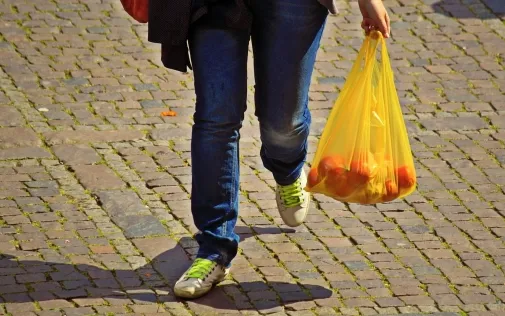
The lifespan of a plastic bag is short and has a huge environmental impact. On average they are used for 12 minutes and are then left to decompose, often polluting the land or water. For Zero Waste Barcelona the solution is simple: reuse them.
Food for a special dinner, slippers, dirty laundry. A new geranium, our wet bathing suit, seeds to plant in our garden… Some of the things they carry are important, others not so much. But we never value a plastic bag for all its work; we only value its content. The lifespan of a plastic bag is nomadic and wasted. Take a second to think about this. You were born in a factory in the USA or India, in unbearable heat. You are one of the 2.5 trillion plastic bags made this year. They heat you up to high temperatures and subject you to high pressure and turn you into sheets or filaments to shape you. Finally, they stamp your mother’s name on the front and that’s it, you’re now ready to serve Mankind…but only briefly.
A long yet unfulfilling life
As the song goes, you only get to live once. Only 1% of plastic bags are recycled. Most recycling facilities don’t want you because you’ll clog up the machinery and you’re not worth it.
With time, you’ll break down into tiny pieces, smaller every day and for hundreds of years you will pollute land and water. The tough reality is that, on average, you’ll only be used for 12 minutes, after that, you are discarded.
You were first banned in Bangladesh in 2002. In Rwanda, border police sift through travellers’ baggage and hands them with a hefty fine if they see you in their bags. Dozens of countries have followed suit. And you can be toxic for humans. Your Bisphenol A and phthalates cause problems for our health.
Barcelona stands against bags... plastic ones
For some time, consumers in this city pay if they want you. Now several alternatives have emerged. Supermarkets and shops offer paper bags, but for these paper bags to be produced, you require five times more energy than for plastic ones, seventeen times more water and shipping these paper bags comes with higher CO2 emissions. However, paper bags are recycled much more than plastic ones. And what about compostable ones?
At most recycling facilities it is hard to tell apart a bag that is compostable from one that isn’t. The same happens with cutlery: they are so similar that it is very difficult to tell what material they are made of and they are often discarded.
The big mix-up between biodegradable and compostable
Biodegradable means they break down into tiny pieces, but they can still pollute the land with their toxic components. Compostable means they are made mainly from plant-based products and are safe to mix with earth. They degrade rapidly, sometimes even before we make it back home with our shopping.
This is why the best that can happen to a plastic bag like you is that we use you until you start to break. At the end of the day, it isn’t your fault. And a paper or cloth bag is no good to carry a wet swimming suit! From now on we should avoid single-use containers. The solution is almost always to reuse.



Add new comment